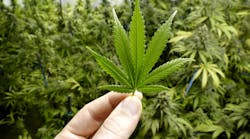As states move to revise marijuana laws, employers and municipalities are revising their pre-employment drug screenings to exclude the presence of tetrahydrocannabinol (THC) in test results.
Most zero-tolerance testing policies aimed at the Schedule I drug were enacted in the 1980s fueled by Nancy Reagan's anti-drug campaign which spawned widespread measures to curb marijuana use. President Ronald Reagan signed the Drug-Free Workplace Act in 1987, which required employers and entities receiving federal assistance to enact staunch, zero-tolerance drug-free workplaces in order to receive grants and federal monies.
Negative public sentiment for cannabis was at an all-time high, but attitudes toward marijuana throughout the past 30 years slowly shifted to accepting the reality of legalization and eventually the relaxation of workplace drug policies.
Paul Armentano, deputy director of the National Organization for the Reform of Marijuana Laws (NORML), explains the change to EHS Today, "Clearly from the outside looking in, it is apparent that there is a trend among lawmakers in certain regions of the country to revisit the issue of pre-employment screening for marijuana. And, it is likely that they are revisiting this issue because the laws around cannabis, and the public adult consumption of cannabis, have changed in many of these jurisdictions."
In early May, New York City declared it unlawful “for an employer, labor organization, employment agency, or agent thereof to require a prospective employee to submit to testing for the presence of any tetrahydrocannabinols or marijuana in such prospective employee’s system as a condition of employment.” The early-May ruling excluded employees and candidates in "safety-sensitive positions," such as police officers, commercial drivers and workers who fall under federal drug testing guidelines.
On May 12, city officials in Rochester, NY. voted to end pre-employment marijuana testing for non-safety sensitive city employees.
East District Councilmember Mary Lupien applauded the effort at the meeting, saying, "This is an important piece of legislation that I think is going to do a lot of good."
Richmond, Va. council members also recently passed a resolution to exclude non-safety sensitive employees and job applicants from marijuana testing.
THC is a psychoactive constituent, which means that a worker's motor skills and cognitive ability could be affected while performing various tasks. In a 2019 National Safety Council (NSC) survey, 81% of employer were "concerned" about the drug having a negative impact on their workforce.
In a response to the survey, Lorraine M. Martin, NSC president and CEO, called for researchers to develop new ways of detecting cannabis impairment, saying, “In order to protect our employees and those around them, we need to acknowledge the impairing effects of cannabis. We urge employers to implement policies stating no amount of cannabis consumption is acceptable for those who work in safety-sensitive positions.”
Although marijuana remains the most commonly identified illicit drug in a workplace screening, that doesn't necessarily mean an employee or candidate is unable to perform their duties. A positive test also does not equate to a worker using while they are on-the-clock either.
"It was one thing to have a blanket policy that said we are not going to hire somebody who has a history of using marijuana use because marijuana use was against the law," Armentano says.
Now that marijuana use is decriminalized or legal in most states, it's harder to justify zero tolerance, blanket policies. He adds, "There needs to be more legitimate reason than that, as to why these individuals ought to be denied employment. When you take the element of criminality out of this equation, there isn't much of a justification left for saying these individuals are not qualified for this particular job. There's certainly no evidence that individuals who use cannabis in their off time are any less qualified for employment, or any more likely to have some sort of accident while in the workplace."
A 2020 review published in the journal Substance Use & Misuse examines whether there is a causal relationship between cannabis use and occupational injuries. Researchers affiliated with the Northern Medical Program, University of British Columbia and the Canadian Institute for Substance Use Research (CISUR) analyzed 16 reviewed studies, concluding, "the current body of evidence does not provide sufficient evidence to support the position that cannabis users are at increased risk of occupational injury."
They add, "further, the study quality assessment suggests significant biases in the extant literature are present due to potential confounding variables, selection of participants, and measurement of exposures and outcomes. Future high-quality evidence will be needed to elucidate the relation between cannabis use and occupational injury."
The road to revising drug testing policies is bound to be filled with obstacles. For post-accident drug testing, it all boils down to liability.
"The reason why post-accident drug testing is done is to try to determine liability," Armentano says. "Was the worker impaired on the job, and thus responsible for the accident, or was the worker unimpaired on the job, and therefore, potentially the employer is liable? Those are the sort of questions that are being asked when there's an accident in the workplace. The reality is most conventional drug testing and urinalysis in particular provide no concrete answers to those questions. So for that reason alone, it behooves employers to try to consider other alternatives."
Employers likely won't move from a blanket policy to complete abolishment of testing just because a state has approved marijuana use for recreation or medicinal purposes. Incremental change is the name of the game.
Armentano comments, "It certainly is probable that during the early stages of these changes, employers are going to exhibit an abundance of caution. They're arguably going to potentially only apply these policies to certain employees, and keep these policies in place for other, more safety-sensitive employees. So just like we've seen overall culturally with gradual changes in the perception of marijuana, we're going to see these gradual changes beginning at the state and local level in the workplace, but they're not going to be all at once."
